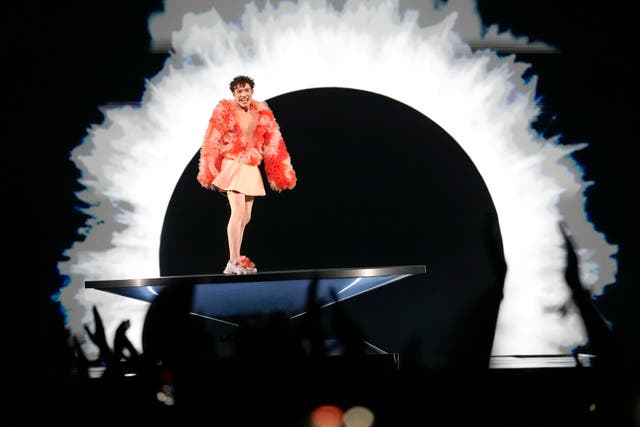Israel’s singer has insisted the Eurovision Song Contest in Sweden remains “safe for everyone” amid protests against her participating as she made the final.
Eden Golan, 20, whose emotional Hurricane was reworked from a previous track called October Rain, which was thought to reference the Hamas attacks on Israel, performed at the second semi-finals on Thursday evening in Malmo Arena.
Earlier in the day, thousands of pro-Palestinian protesters walked across the streets of Malmo from Stortorget to Molleplatsen to show their support for Gaza and condemn Israel taking part in Eurovision amid the conflict.
The Netherlands act Joost Klein told Golan, who is representing Israel, to answer a question on whether she is comprising the safety of other contestants at a press conference.
A journalist asked: “Have you ever thought that by being here you bring risk and danger for other participants and public?
Golan was told she did not have to answer the question, but Klein chimed in saying: “Why not?”
She said: “I think we’re all here for one reason and one reason only and the EBU (European Broadcasting Union) is taking all safety precautions to make this a safe and and united place for everyone and so I think it’s safe for everyone and we wouldn’t be here (if not).”
The Israeli act also said she was “overwhelmed with emotions” and that she was “super excited to go on stage once more, and share that of my love with everyone”.
Earlier, when Klein was asked about if his song can unite people by music, he replied saying: “I think that’s a good question for the EBU.”
Golan opened with a back bend, before launching into her song and received claps and cheers from the audience while dressed in a flowing sand-coloured dress.

The event’s organisers had said they will not “censor” the audience after Golan was booed during rehearsals on Wednesday and there were reportedly shouts of “free Palestine”.
Switzerland’s Nemo, whose operatic-pop song The Code is seen as one of the favourites to win on Saturday, made the final along with Klein, with his irreverent and silly Europapa, and Norway’s Gate with the folkish Ulveham.
Also making the final was Latvia’s Dons, Austria’s Kaleen, Greece’s Marina Satti, Estonia’s 5Miinust x Puuluup, Georgia’s Nutsa Buzaladze and Armenia’s Ladaniva.
The European Broadcasting Union (EBU), whose members approved Israeli broadcaster Kan, has taken a strong stance, as in previous years, against political messages at Eurovision and flags and symbols from non-competing countries.
Despite the position, Tuesday’s first semi-final saw former Swedish contestant and opening act Eric Saade wear a keffiyeh pattern material, commonly used by people who want to show they are pro-Palestinian, on his arm.




Comments: Our rules
We want our comments to be a lively and valuable part of our community - a place where readers can debate and engage with the most important local issues. The ability to comment on our stories is a privilege, not a right, however, and that privilege may be withdrawn if it is abused or misused.
Please report any comments that break our rules.
Read the rules hereLast Updated:
Report this comment Cancel